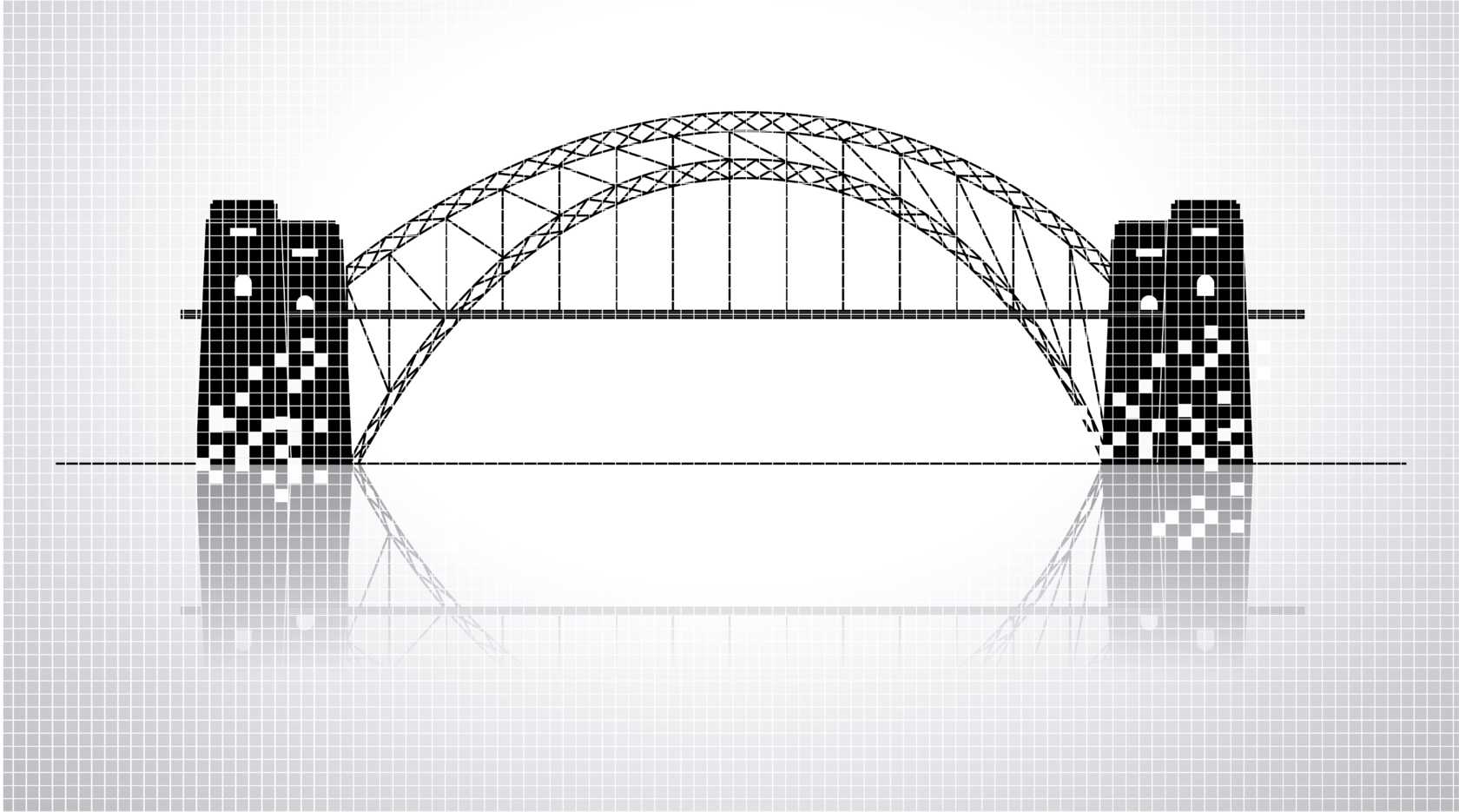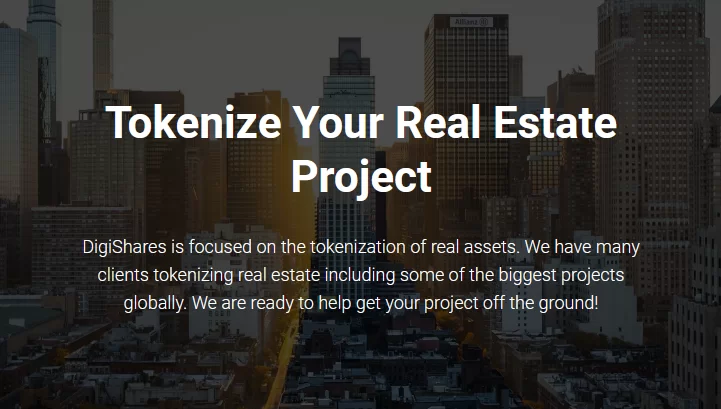What is blockchain?
What is tokenization?
What are the benefits of tokenization?
Why is it relevant to real estate?
DigiShares provides a white-label tokenization platform for real estate. In this article we will explain blockchain and tokenization and how the use of these technologies can provide real value for the real estate industry.
Blockchain, Real Estate, and Tokenization
Tokenization is the concept of representing the ownership of securities (company equity, bonds, etc.) as tokens on the blockchain. These tokens are called security tokens, tokenized securities, or increasingly digital assets.
Real estate is the single biggest asset class that may be tokenized. Total real estate is worth around $228 trillion today and only 7% of this is available to retail investors. However, more than 80% of people believe real estate to be a good investment. DigiShares aims to help close this gap.
Real estate can be tokenized in different ways. Mostly, it is done by tokenizing the equity of the company that owns the real estate project by financing a new development or refinancing an already existing yield-generating property. So, for the purpose of this blog article, we are primarily considering company equity when referring to tokenized securities.
The blockchain itself is a global decentralized ledger (or more easily understood a database or excel sheet). The blockchain incentivizes participants to maintain consensus about the contents of this database and massively disincentives cheating. One way of cheating is to “double spend”, i.e., spending 1 unit of digital currency twice to purchase twice as much as you can afford and hence cheating one of the sellers out of their payment. With blockchain technology, the infamous “double spending” problem was solved for the first time thereby enabling us to manage units of digital currencies (as well as digital assets) in a safe and secure manner.
There are many benefits with tokenization, but generally it makes the processing and management of securities much more efficient and less expensive. Transactions can increasingly occur from peer-to-peer without intermediaries who mainly provide value by maintaining centralized ledgers or databases guaranteeing ownership and value. With the blockchain taking over this task, these intermediaries can be removed from the process enabling investors to transact in an x10 faster and less expensive fashion.

Efficiency Improvements
Benefits of tokenization fall into three categories: efficiency (time & cost) improvements, new capabilities, and other values. All of these benefits are relevant to the real estate industry. Efficiency improvements and new capabilities such as trading and fractionalization are probably the most important to the real estate industry.
In terms of efficiency improvements, the main benefit is the general ability to digitize and automate processes.
Having securities in a digital format makes it possible to work with these securities programmatically. They can exist in users’ own wallets and can exist independently of a bank. Marc Andreesen’s famous quote, “Software is eating the world”, refers to the fact that every time an industry becomes software-enabled it leads to a huge efficiency increase and a huge amount of new innovation. The same happens in the world of securities. Tokenized securities are embellished with so-called “smart contracts” – small computer programs that regulate the properties and actions of the security. These smart contracts can be constructed to regulate governance and compliance. They can, for instance, independently determine whether a security can be transferred to a specific buyer or not, based on the following: KYC/AML of the buyer, whether the maximum number of this type of investor has been exceeded, or the accreditation status of the investor. The automation of these processes results in an x10 efficiency increase, an x10 reduction of cost, and an x10 reduction in human errors.
Peer-to-Peer Trading
In terms of new capabilities, tokenization makes it possible to easily support peer-to-peer trading of tokenized securities. This generally is not possible today with existing technologies and only blockchain technology now makes it possible. Listed securities are traded on exchanges and have significant liquidity, but unlisted securities (real estate, SME company equity, energy projects, VC funds, etc.) are generally not tradeable and suffer from extremely low liquidity. This means that investors are accustomed to being locked into these investments for many years, and if they want to sell beforehand, they often suffer a significant liquidity penalty in the sales price.
Inexpensive and efficient liquidity for unlisted securities is a totally new opportunity for investors. It generally didn’t exist before blockchain and tokenization. Specialized secondary trading exchanges are turning up to provide sophisticated trading of security tokens. Companies such as DigiShares provide simpler OTC-like marketplaces that can generally be run independently by the issuers to provide some degree of liquidity within their projects. We envision that in the future real estate developers may run their own trading exchanges to provide liquidity to their investors.
Fractionalization
The x10 time and cost improvement enables another new capability, – the ability to fractionalize assets. With the normal complicated and paper-based processes for issuance, management, and trading of unlisted securities, it is uneconomical and prohibitive to involve more than 10-20 investors in each project. However, when processes become digitized and automated and are managed by an investor portal such as the one provided by DigiShares, then it suddenly becomes possible and attractive to involve 100 or even 1,000 investors in each project. The portal automatically handles on-boarding of investors and their purchase of tokens (shares).
The portal also automatically keeps the share cap table (shareholder register) updated in relation to trading activities. This in turn makes it possible to reduce the typical minimum ticket size for real estate projects from USD/EUR 100,000 down to perhaps USD/EUR 1,000 or even 100. This is called fractionalization – the ability to fractionalize assets down to very small sizes.
Democratization
Fractionalization in turn leads to democratization. In the US and Asia, most financing rounds for real estate projects are limited to accredited investors for regulatory reasons. In Europe, the regulation is more flexible and most EU member states allow fund-raising up to EUR 5 or 8m from retail investors. In any case, with fractionalization it becomes possible to reduce the ticket size and allow retail investors to participate in the financing round. This is beneficial for the issuer who can now target institutional, accredited, and retail investors. It is also very beneficial for the retail investors who are now able to diversify their portfolios in the same way in which wealthy people have done for many years.
From our talks with many real estate developers, we see that many are truly interested in making a difference and enabling retail investors to participate in their projects. This supports the UN sustainable development goal number 8 – “decent work and economic growth.” It increases the chances for retail investors to build and maintain their savings in an inflationary environment.
Other values introduced by tokenization include global standards and interoperability, secure logging of transactions, and a factor x10 increased design space.
Global Standards and Interoperability
As many may interject, digital securities have been around for many years through banks and exchanges. However, the digital securities have only been available through banks and exchanges and have not been able to exist on their own outside of these institutions in people’s own computers or mobile devices. The banks and exchanges have naturally taken payments for their services as guarantors of people’s portfolios and have acted as intermediaries in any securities process charging both fees and imposing delays.
Others may interject that they have been able to partake in crowdfunding platforms and invest small amounts of money into startup projects in the past decade. More recently, real estate projects have been added to this list. Yes, this is true. But since these platforms do not use blockchain technology, they are “siloed” – their version of digital securities is not standardized and cannot exist outside their platform. Users of these platforms will be tied to these platforms alone and will not benefit from a large and booming ecosystem as we see with tokenization.
Within the tokenization space, there are a few dominating standards for tokenized securities and digital assets including ERC-1400 which is used by DigiShares. These standards ensure that an investor who purchased a tokenized share in Denmark can later sell it anywhere else in the world, and an issuer who financed his project with the DigiShares platform can later have his tokens traded on a licensed security token exchange. This provides value to any participant in the tokenization ecosystem and it provides for a 1+1 > 2 equation in which innovations provided by many collaborating industry participants multiply and accelerate the entire industry.
Secure Logging
Another great benefit of blockchain and tokenization is the secure logging of all transactions. Due to the nature of the blockchain, historic transactions cannot be modified or deleted and they remain visible forever. This makes the blockchain very suitable for tracking transactions related to securities processing and trading, for accounting, auditing, and also for tax considerations. Personal and private data such as name, address, number of shares, etc., are not kept on-chain, but rather referred to from the tokens and stored in password-protected off-chain documents that can only be accessed by authenticated persons such as the owner and the issuer.

Exponentially Increasing Design Space
The most important and long-term benefit of tokenization is the earlier indicated massive new design space opened up by securities becoming digitized, independent, and programmable. This design space increases because we now not only have financial people thinking about securities, but also programmers, software architects, crypto people, and DeFi people. Some examples of the securities that benefit from tokenization include those with voting rights and dividend rights that are dependent upon duration of ownership or other characteristics, designer securities that blend characteristics of equity and bonds, and security tokens with various types of participation rights such as physical access to real estate, etc., etc.
Real Estate Tokenization
So, that finally leads to the following question: Why is all this relevant to real estate developers? We see real estate developers being interested in this technology for many reasons including the importance of being first movers and early adopters of new technology. They also understand the importance of being able to digitize and automate many processes related to financing and management of projects and the importance of becoming able to fractionalize and invite new types of retail investors to participate. They are also interested in being able to access the international market and offer investors liquidity in the form of a trading marketplace.
With the DigiShares white-label platform, real estate developers will get a structured platform that enables them to expedite and manage processes related to financing, refinancing, or selling real estate development projects. In addition, they will be able to efficiently and consistently manage a group of owners of a specific project with all that entails – the maintenance of the share cap table, the facilitation of shareholder meetings, the payment of dividends or interest, and the reissuance of lost tokens, etc.
If you are interested in learning more, please contact DigiShares at info@digishares.io

Tokenize Your Real Estate
Many of our current projects are real estate tokenization projects, and for those of you who are specifically interested in real estate tokenization we have created a special page where you can learn about real estate tokenization and how to tokenize your project.
